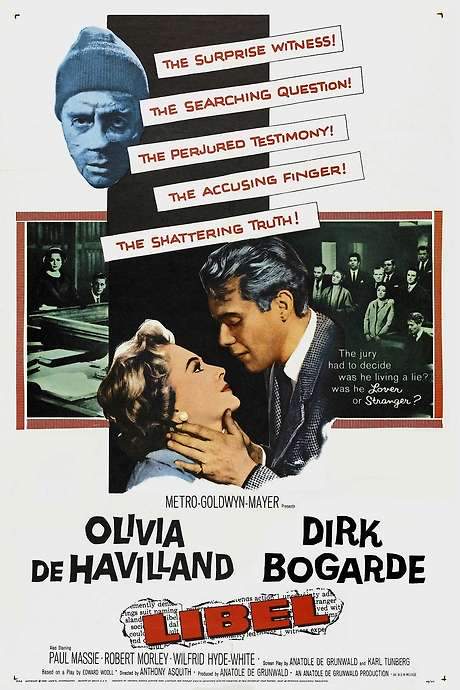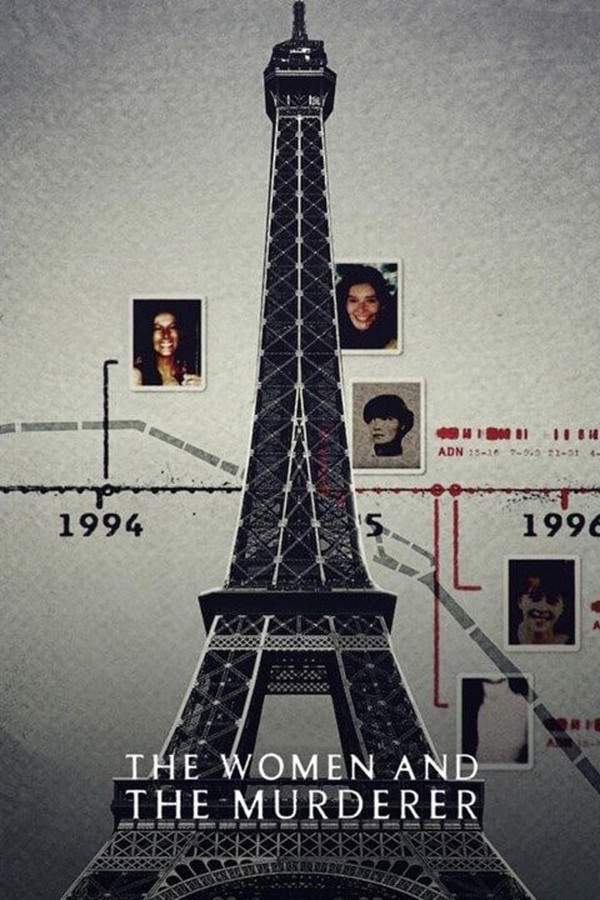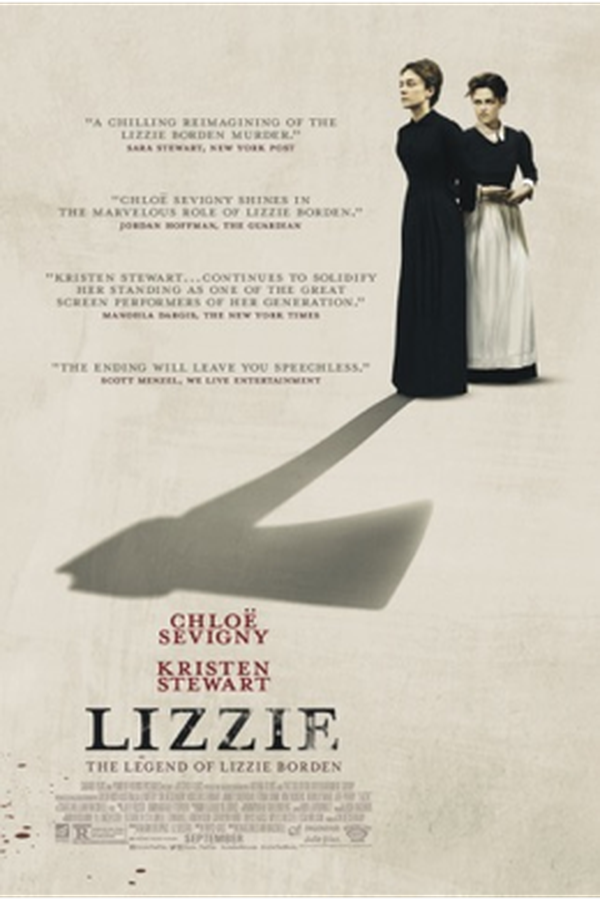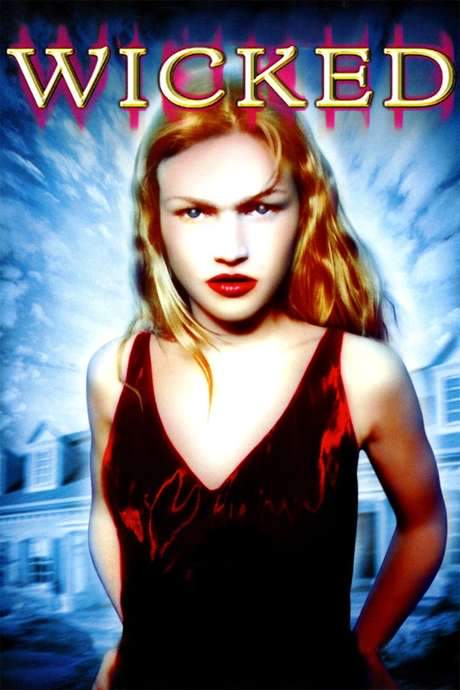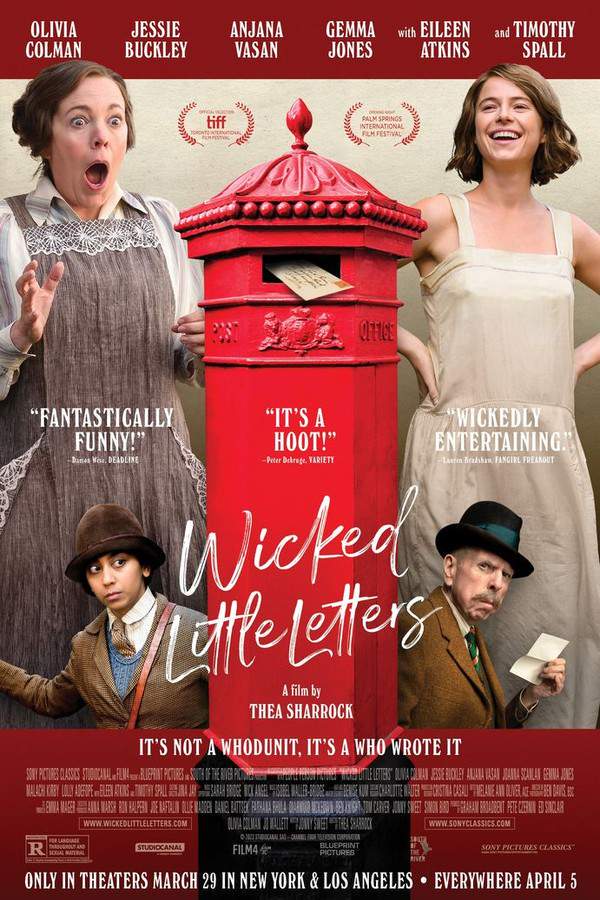
Wicked Little Letters
In the 1920s, a seemingly respectable woman named Edith Swan finds herself embroiled in a scandalous conflict with a vivacious Irish immigrant, Rose Gooding, in a quiet English seaside town. What begins as a series of increasingly outrageous letters soon spirals into a shocking legal battle, exposing the hypocrisy and hidden lives within the community and based on a true story.
Warning: spoilers below!
Haven’t seen Wicked Little Letters yet? This summary contains major spoilers. Bookmark the page, watch the movie, and come back for the full breakdown. If you're ready, scroll on and relive the story!
Wicked Little Letters (2024) – Full Plot Summary & Ending Explained
Read the complete plot breakdown of Wicked Little Letters (2024), including all key story events, major twists, and the ending explained in detail. Discover what really happened—and what it all means.
In Littlehampton during the height of the suffragette movement in 1920, an atmosphere of unease unfurls as Edith Swan, a devout Christian spinster portrayed by Olivia Colman, faces a deluge of hate mail that undermines her sense of safety and dignity. This onslaught of vitriol causes significant distress not only for Edith but also for her oppressive father, Timothy Spall, and her gentle mother, Gemma Jones. The count of these letters is staggering, with a total of 19 brimming with crude language, compelling Edward to turn to the local authorities for assistance. They promptly zero in on Rose Gooding, an Irish migrant and single mother played by Jessie Buckley, whom they suspect to be the instigator of this malicious campaign, largely due to her reputation for colorful language.
The former connection between Edith and Rose, intertwined with a bond formed through their shared experiences, has been irrevocably strained. This shift stems from a raucous incident at a birthday celebration for Edward, where Rose’s winning verbal exchange with a guest leads to the unraveling of their friendship, worsened by accusations that Rose had tipped off child protective services regarding Edith. As tensions escalate, Rose is unjustly arrested and can neither post bail nor ensure her daughter Nancy, played by Alisha Weir, is cared for, leaving her in the hands of Bill, her partner.
Despite her underlying skepticism about Rose’s involvement, police officer Gladys Moss, interpreted by Anjana Vasan, finds herself impeded by her superior, Paul Chahidi, who dismisses her doubts based on misogynistic prejudice. Desperate for understanding, Rose reaches out to Edith’s friends Ann, Mabel, and Kate to gather insights into the situation. Kate’s hostility contrasts with Ann and Mabel’s compassion, leading to Rose feeling isolated. While initially aiming to gain Gladys’ support, Rose faces rejection, but eventually, it’s her friends who come to her aid, bailing her out upon her release.
The unfolding drama rapidly catches the attention of the larger community, transforming the case into a national sensation that even reaches Westminster. It is at this critical juncture that Gladys resolves to take charge of her investigation, recognizing the systemic discrimination shared by both herself and Rose. Meanwhile, the spark of nefarious intent in Edith begins to shimmer through as she grapples with her smoldering resentment against her father, crafting a letter that inadvertently becomes a key clue in the case when intercepted by an unsuspecting Victoria, resulting in catastrophic consequences.
As police formalities conclude, Gladys begins to piece together striking resemblances between Edith’s handwriting and the loathsome letters, yet her findings are brushed aside by Spedding. In defiance, she enlists Ann, Mabel, and Kate in a rogue investigation, deliberately excluding Rose. As the trial date looms, Edith hatches clever strategies to elude Gladys’s notice while posting another incriminating letter that could alter the outcome.
During the climactic trial, Rose confronts her past, taking ownership of her vocal outbursts that perhaps express her frustrations more suitably than the anonymous letters. Nevertheless, Rose’s truth unravels and reveals that Nancy’s lineage is not what she’d previously disclosed, sending shockwaves through her family. At the same time, Edith uncovers that her father had been the one to alert child services about Rose, casting an even darker shadow over their already strained relationship.
In a thrilling turn of events, Gladys and her confidants devise a clever plan involving stamps with invisible ink to capture Edith’s inevitable attempt to frame Rose once more. As tensions mount and Rose faces an unexpected arrest attempt, she manages to confront Edith, igniting a vehement confrontation that showcases the bitter resentment underlying their intertwined fates.
In an unexpected twist, the letter Edith dispatches for her own vindication falls into the hands of Gladys’s niece, revealing the hidden ink and clinching Edith’s downfall while liberating Rose from her wrongful blame. The aftermath witnesses a moment of reluctant reconciliation between Edith and Rose, where regret is acknowledged, yet so is the resolve against Edward’s harshness.
Ultimately, as Edith is led away to serve twelve months of hard labor, Rose walks free and is spared further tumult, while Gladys gains well-deserved recognition for her relentless pursuit of justice, wrapping up a tale steeped in societal struggle and transformation.
Last Updated: November 17, 2024 at 15:56
Ending Explained – What Happens at the End of Wicked Little Letters?
Still wondering what the ending of Wicked Little Letters (2024) really means? Here’s a spoiler-heavy breakdown of the final scene, major twists, and the deeper themes that shape the film’s conclusion.
The ending of Wicked Little Letters reveals that Edith, overwhelmed by her oppressive home life and her desire for freedom, was actually the one behind the abusive letters all along. Her hatred of her father’s control and her jealousy of Rose’s fearless independence drove her to write those letters to herself, stoking the community’s suspicion of Rose. Edith’s handwriting was hidden in plain sight—hidden within her own letters—yet her guilt was only uncovered when detective Gladys Moss and her friends used invisible ink to trace her name on the stamps. They caught Edith in the act of mailing her final letter, and she was arrested, which was a catharsis for Gladys, symbolizing a break from societal expectations and gender roles. Interestingly, Edith’s confession of guilt didn’t bring remorse; instead, she expressed relief and a sense of liberation. For her, the arrest marked the end of her lifelong subjugation and the beginning of her true self-expression, finally free from her father’s domination and the false image she had maintained. The story’s finale highlights how the true culprit’s uncovering not only brings justice but also offers Edith a painful yet freeing honesty with herself about her suppressed feelings and desires.
Last Updated: June 25, 2025 at 08:44
Explore Movie Threads
Discover curated groups of movies connected by mood, themes, and story style. Browse collections built around emotion, atmosphere, and narrative focus to easily find films that match what you feel like watching right now.
Movies about fighting wrongful accusations like Wicked Little Letters
Stories of uncovering truth against systemic prejudice and community hypocrisy.If you enjoyed the tense justice battle in Wicked Little Letters, explore more movies like it. Our collection features historical and contemporary dramas where characters fight false accusations and expose community hypocrisy, leading to satisfying, uplifting conclusions.
Narrative Summary
The pattern involves an innocent person being wrongly accused, often exposing deeper societal biases like sexism or classism. The story unfolds as a procedural or investigative journey, pitting determined individuals against a resistant system, culminating in a public vindication and the exposure of hidden truths.
Why These Movies?
These films share a core narrative of fighting injustice, generating suspense and frustration from the legal or social stakes. They balance a tense, serious tone with a ultimately hopeful and satisfying resolution, creating a cathartic viewing experience focused on truth and resilience.
Movies with unlikely female friendships like in Wicked Little Letters
When two very different women unite to challenge a corrupt system.Fans of the dynamic between Edith and Rose in Wicked Little Letters will enjoy these films. Discover more movies featuring unlikely female duos who overcome their differences to fight for justice, often in period settings or against a repressive social backdrop.
Narrative Summary
The narrative focuses on the collision and eventual collaboration of two contrasting female characters. Initial conflict or distrust gives way to a powerful alliance as they work together to solve a mystery or fight an injustice, revealing hidden strengths and challenging societal expectations.
Why These Movies?
This thread groups movies based on the powerful dynamic of an unlikely female partnership. The shared elements include a focus on character contrast, the development of mutual respect, and a central plot driven by their combined efforts to overcome a common enemy or uncover a truth.
Unlock the Full Story of Wicked Little Letters
Don't stop at just watching — explore Wicked Little Letters in full detail. From the complete plot summary and scene-by-scene timeline to character breakdowns, thematic analysis, and a deep dive into the ending — every page helps you truly understand what Wicked Little Letters is all about. Plus, discover what's next after the movie.
Wicked Little Letters Timeline
Track the full timeline of Wicked Little Letters with every major event arranged chronologically. Perfect for decoding non-linear storytelling, flashbacks, or parallel narratives with a clear scene-by-scene breakdown.

Characters, Settings & Themes in Wicked Little Letters
Discover the characters, locations, and core themes that shape Wicked Little Letters. Get insights into symbolic elements, setting significance, and deeper narrative meaning — ideal for thematic analysis and movie breakdowns.

Wicked Little Letters Ending Explained
What really happened at the end of Wicked Little Letters? This detailed ending explained page breaks down final scenes, hidden clues, and alternate interpretations with expert analysis and viewer theories.

Wicked Little Letters Spoiler-Free Summary
Get a quick, spoiler-free overview of Wicked Little Letters that covers the main plot points and key details without revealing any major twists or spoilers. Perfect for those who want to know what to expect before diving in.

More About Wicked Little Letters
Visit What's After the Movie to explore more about Wicked Little Letters: box office results, cast and crew info, production details, post-credit scenes, and external links — all in one place for movie fans and researchers.

Similar Movies to Wicked Little Letters
Discover movies like Wicked Little Letters that share similar genres, themes, and storytelling elements. Whether you’re drawn to the atmosphere, character arcs, or plot structure, these curated recommendations will help you explore more films you’ll love.
Explore More About Movie Wicked Little Letters
Wicked Little Letters (2024) Scene-by-Scene Movie Timeline
Wicked Little Letters (2024) Movie Characters, Themes & Settings
Wicked Little Letters (2024) Ending Explained & Theories
Wicked Little Letters (2024) Spoiler-Free Summary & Key Flow
Movies Like Wicked Little Letters – Similar Titles You’ll Enjoy
Lizzie (2018) Movie Recap & Themes
Wicked Memoirs of Eugenie (1980) Detailed Story Recap
The Wicked Lady (1983) Full Movie Breakdown
Be a Wicked Woman (1990) Detailed Story Recap
Wicked Stepmother (1989) Complete Plot Breakdown
The Wicked Darling (1919) Ending Explained & Film Insights
Wicked Ones (2020) Film Overview & Timeline
A Wicked Woman (1934) Spoiler-Packed Plot Recap
The Letter (1940) Film Overview & Timeline
The Letter (1929) Film Overview & Timeline
The Wicked Lady (1945) Full Movie Breakdown
Wicked (1998) Story Summary & Characters
Little Witches (1996) Film Overview & Timeline
Wicked Woman (1953) Complete Plot Breakdown
Wicked as They Come (1956) Full Movie Breakdown






